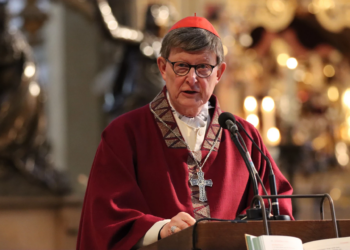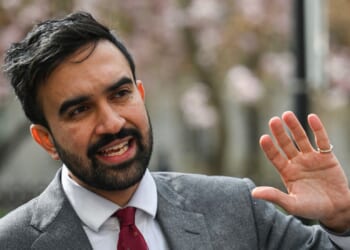National Catholic Register, Jun 6, 2025 /
14:15 pm
After disruption by anti-Catholic protesters in Oklahoma and Texas in recent days, organizers of the National Eucharistic Pilgrimage say they fully expect that the group of protesters, organized principally by a Protestant church in Texas, will continue to follow and attempt to disrupt the cross-country Eucharistic procession for the remainder of its route to Los Angeles.
“I’m calling on all Catholics to show up for Jesus. This is our opportunity to step out in faith, to step out in witness, and to witness to the real presence of Jesus in the Eucharist,” said Jason Shanks, president of the National Eucharistic Congress, at a June 5 press conference.
The pilgrimage, which began in mid-May in Indianapolis, is a 3,300-mile, 10-state trek that has already brought a group of eight young Catholic “Perpetual Pilgrims” to the heart of Texas with the Eucharist, and it will conclude in Los Angeles in late June.
The goal of the pilgrimage, which is a continuation of the unprecedented four national pilgrimages that took place last summer, is to bear public witness to the Church’s teaching that Christ is truly present in the Eucharist and to invite members of the public to join the processions and celebrate their belief in the Eucharist as well.
Videos shared with EWTN News and taken by the pilgrims on May 30, while the procession was in the Diocese of Tulsa, Oklahoma, show Catholic participants in the procession walking and singing while a young man on the sidelines, speaking through a bullhorn and walking alongside the crowd, deplores Eucharistic devotion as “idolatry.”
More recently, on June 4 in Dallas, the pilgrims encountered small groups of protesters walking with bullhorns and holding signs with anti-Catholic messages. Videos show large numbers of Catholics processing down a suburban street with the Eucharist while singing hymns in Spanish. Some of the protesters, including those holding anti-Catholic signs, appeared to be families with small children.
Shanks described the protests as “unexpected,” given that the pilgrimages last year did not engender pushback of this kind. He said the protests, which have swelled in recent days to some 40 to 50 “well-organized” people, are being principally organized by the Church of Wells, a Protestant congregation based in a small town about three hours southeast of Dallas.
The website of the Church of Wells, a small but influential and controversial congregation, includes numerous diatribes against Catholic belief, including belief in the real presence of Christ in the Eucharist.
The idea that the Catholic view of the Eucharist would be subject to debate, and even to ridicule, is “not new for Catholics,” Shanks noted, and dates back all the way to the Bread of Life discourse in John’s Gospel.
Still, Shanks said the shouting and the debates taking place amid the pilgrimage have been a source of “interior suffering” for the pilgrims, and he called on all Catholics to respond not by engaging with protesters directly but rather with a “silent witness” to the truth of the Catholic faith with a spirit of “charity and humility.”
“We’re asking Catholics to come and evangelize through their silent witness, and their walk, because these protesters are focused on antagonizing, trying to get into debates, so they can put it online … because that’s how they raise money,” he continued.
Shanks said pilgrimage organizers have been engaged behind the scenes with law enforcement and security personnel to make sure the pilgrimage is a safe experience for all involved, though there is no reason to believe at this time that the protests will become violent, he added.
He also expressed appreciation and pride for the Perpetual Pilgrims, who have had to deal with the vocal protesters day after day, and urged Catholics to keep the pilgrims in their prayers.
“I’m so proud of how they’ve been representing us as a Church. … We need to be, as a Church, united in solidarity with them,” Shanks said.
At the Thursday press conference, several of the pilgrims spoke directly about the challenges of encountering the protests and the solace they’ve received through constant prayer.
Ace Acuña spoke about how the experience has led him to a deeper understanding and appreciation of Jesus’ assurances about the reality of persecution for those who follow him. Biblical passages about enduring persecution have never come “more alive” for him than during this time, Acuña said.
(Story continues below)
Subscribe to our daily newsletter
“I honestly feel like my prayer has never been more fervent in my life,” he said, adding, quoting Acts 5:41, that it remains “a joy to suffer insults for the sake of the Name.”
Johnny Silvino Hernandez-Jose, another pilgrim, spoke about how important it has been for him to remember the reason why they are doing the pilgrimage and “not let it be overshadowed by something so little, compared to Jesus Christ.”
For Leslie Reyes-Hernandez, although the words of the protesters sting, she said she sees this challenge as a deeper calling from the Lord — an invitation to “hear all of the things that he was hearing on his way to the cross.”
Reyes-Hernandez said: “There were people that were in support of him being crucified, but also people who were mourning, like Our Lady, which is an image we can continue to resemble.”
“We get the blessing to be with Our Lord [at] the cross every day, and it’s drawing my faith even closer and closer to him.”
This story was first published by the National Catholic Register, CNA’s sister news partner, and has been adapted by CNA.


















